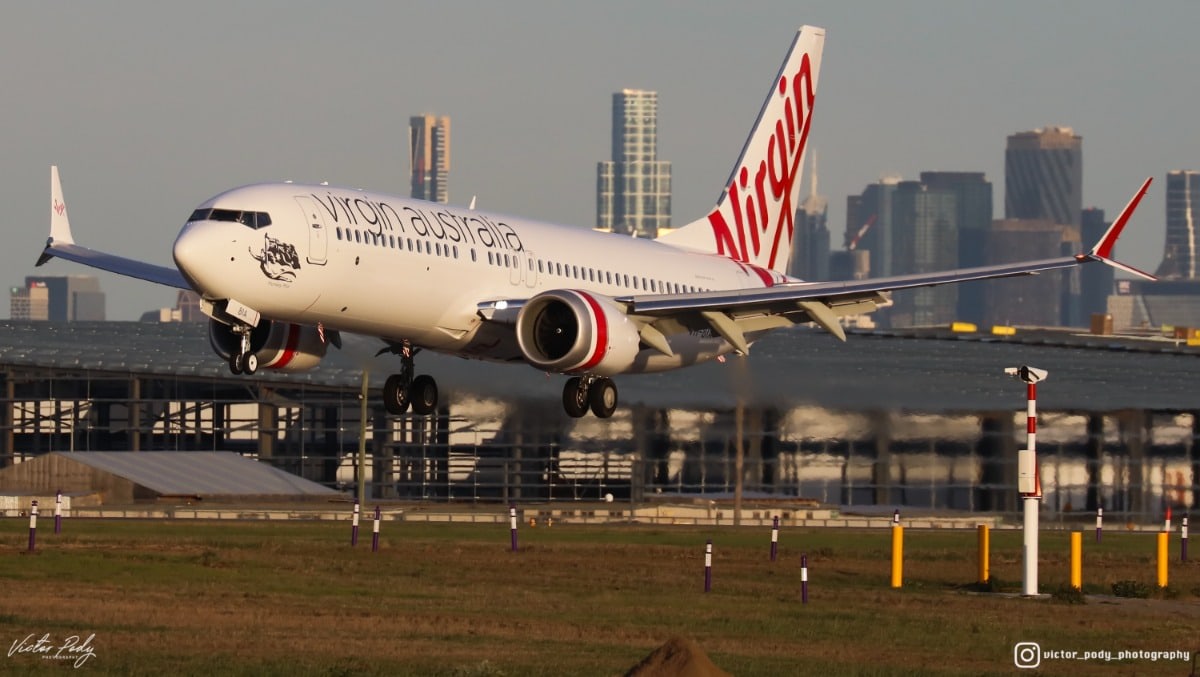
Virgin’s chief legal officer has denied claims the airline is attempting to game the take-off slot system at Sydney Airport to block out smaller rivals.
Susan Schneider told a parliamentary inquiry there was not a “sinister motive” behind the high cancellation rate on flights between the capitals of NSW and Victoria, and it was instead due to the “complexity” of operating at Sydney Airport.
It comes after the ACCC in June argued that larger airlines “can exploit” slot rules to stifle competition from smaller carriers, while Sydney Airport agreed the nationwide system doesn’t work.
A slot is a literal time slot that allows an airline to take off at a specific airport at a particular time.
Australia’s current system for allocating them attempts to shield airlines from having to unexpectedly cancel flights as well as increasing competition domestically, ensuring no one operator holds a monopoly over the best times.
Currently, an airline can hold a timeslot at an airport indefinitely as long as it flies it 80 per cent of the time, allowing carriers to cancel up to a fifth of flights and maintain a monopoly.
It’s led to accusations from critics that airlines take slots they don’t actually need as there is a huge buffer to cancel so many of them, forever blocking out rivals.
However, Schneider told the House of Representatives Standing Committee on Economics on 30 June that the current slot system “works well”.
PROMOTED CONTENT
“There might be some improvements to be made, but I don’t think we would agree that any changes to the ‘use it or lose it’ or 80/20 rules are necessary,” she said.
“Sydney is a complex airport to fly from. It has many operational or regulatory restrictions, including curfew, hourly landing limits and runway limitations.
“We have a slot portfolio that is necessary for us to be competitive, to have scale and to compete against the Qantas Group.
“We think we are the only viable alternative to that very dominant group and that anything that restricted our ability to do that or took away from that is just going to reduce the competitive constraint against Qantas.
“So, whilst we have participated in the review in relation to the Sydney Airport Demand Management Act and there are some changes that we have been in discussion about and agree with, changing the ‘use it or lose it’ rule is not something we think is necessary.”
Schneider added that there are complexities with flying at Sydney, including strong winds that can cause the airport to be reduced to single runway operations, leading to cancellations, as well as its nightly curfew.
The comments were made to MPs on 30 June but only recently published online.
Schneider’s views, though, are at odds with many airports and smaller players in the industry, with the ACCC arguing that the slot rules at Sydney “can materially impede competition”.
“Rules allowing airlines to retain slots in perpetuity exacerbates capacity constraints by limiting the opportunities for new or expanding airlines to acquire slots needed to launch new services and compete,” it said in its final quarterly report into the industry.
“Airlines can exploit the scheme by acquiring and hoarding slots for strategic reasons, such as to prevent competitors’ access to slots, resulting in inefficient slot use and further diminishing opportunities for increased competition. The impact of these flaws in the demand management scheme is more than theoretical.
“Rex’s ability to continue to expand its intercity jet operations and bring choice and competition to more consumers each week will likely be hindered without better access to peak period slots at Sydney Airport.”
Sydney Airport has no say over the rules and backed the ACCC’s position.
“We endorse the ACCC’s common-sense position that the slot management scheme should foster efficiency and robust competition,” said the airport in a statement to Australian Aviation.
“Making it easier for new domestic and international airlines to access slots will lead to more choice for travellers. The problem is that the current rules don’t work. A rule that says it’s OK for airlines to cancel up to 20 per cent of flights makes no sense and incentivises airlines to over-file for slots, leads to more cancellations, and clearly isn’t in the best interests of the travelling public.”
The rules were created by now-Rex deputy chairman John Sharp when he was in government. However, he has repeatedly spoken of his great regret in introducing them.
“We shouldn’t have been so generous with the 80–20 split,” he told Australian Aviation last year.
“It should have been 90–10. Or we should have put an audit process in place to make sure airlines were only cancelling flights within a slot for legitimate reasons or reasons related to something beyond their control. So that’s a mistake we made at that time.”
- SEO Powered Content & PR Distribution. Get Amplified Today.
- PlatoData.Network Vertical Generative Ai. Empower Yourself. Access Here.
- PlatoAiStream. Web3 Intelligence. Knowledge Amplified. Access Here.
- PlatoESG. Automotive / EVs, Carbon, CleanTech, Energy, Environment, Solar, Waste Management. Access Here.
- BlockOffsets. Modernizing Environmental Offset Ownership. Access Here.
- Source: https://australianaviation.com.au/2023/07/virgin-isnt-gaming-slots-to-block-out-rivals-says-legal-chief/



